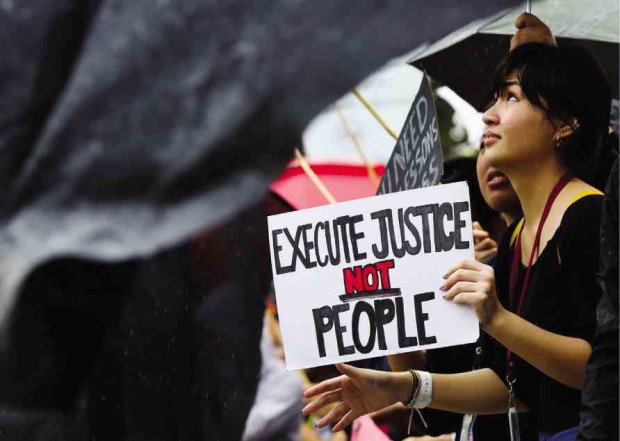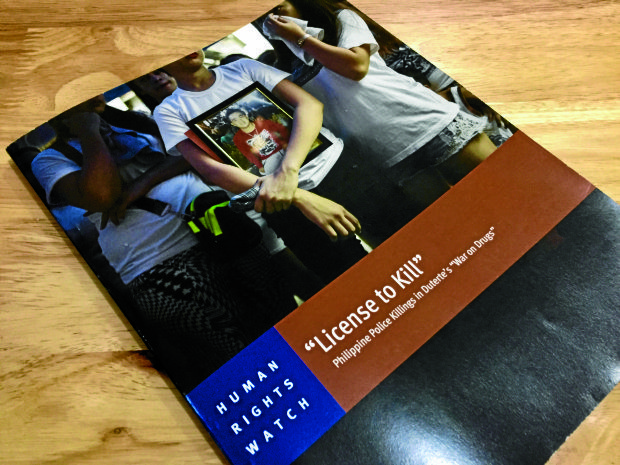‘Duterte liable for drug killings’

OPPOSING DEATH PENALTY Students of Ateneo de Manila University protest the passage of the controversial death penalty bill by theHouse of Representatives. —LYN RILLON
President Rodrigo Duterte and his senior officials are “criminally liable” for extrajudicial killings in his war on drugs, a human rights watchdog said on Thursday.
In a 124-page report titled “License to Kill: Philippine Police Killings in Duterte’s ‘War on Drugs,’” New York-based Human Rights Watch (HRW) said Mr. Duterte and his senior officials instigated and incited the killings of drug suspects in a campaign that could amount to “crimes against humanity.”
HRW also accused the Philippine National Police of falsifying evidence to justify the killings, and said the so-called vigilantes responsible for many of the deaths were working for the police or were actually policemen themselves.
The report said poor communities were being terrorized by the killings, which appeared to be “systematic.”
‘Human rights calamity’
Article continues after this advertisementMore than 8,000 drug suspects—the latest count—have been killed by the PNP and unknown assailants since Mr. Duterte launched the crackdown on narcotics after taking office in June last year.
Article continues after this advertisement“[Mr. Duterte’s] first six months has been a human rights calamity for the Philippines,” HRW said in the report, which documented the President’s statements encouraging the PNP to kill drug suspects.
“President Duterte has ordered and instigated and incited these killings,” said Peter Bouckaert, HRW’s emergencies director and author of the report.
Bouckaert traveled to the Philippines last November and in January, staying for weeks investigating the killings.
Malacañang disputed HRW’s findings, insisting that the killings were not sponsored by the state.
“The observation that the Philippines is in the midst of a ‘human rights calamity’ is thoughtless and irresponsible,” presidential spokesperson Ernesto Abella said in a statement.
‘Is it human rights calamity when more than 1.1 million drug pushers and addicts have voluntarily submitted themselves to authorities?” he said. “Is it a human rights calamity when rehabilitation centers are being constructed to treat drug dependents? Is it a human rights calamity when the sheer scope and magnitude of the emerging narcostate have been exposed?”
The HRW investigation covered 24 police operations that resulted in the deaths of 32 people.
Through interviews with 28 witnesses, relatives of victims, journalists and human rights advocates, and analysis of spot and other police reports, Bouckaert concluded that the PNP was involved in the killings, including the so-called vigilante killings.
No distinction
“While the Philippine National Police [has] publicly sought to distinguish between suspects killed while resisting police arrest and killings by ‘unknown gunmen’ or ‘vigilantes,’ Human Rights Watch found no such distinction in the cases investigated,” the report said.
“Our research also shows that the so-called unidentified gunmen involved in these killings were also working in cooperation with the police and are often policemen themselves,” Bouckaert said.
“It appears the police themselves are carrying out a lot of the killings,” he said, adding that the killings were slightly different from the extrajudicial killings in Davao when Mr. Duterte was mayor of the city.
In the Davao killings, Bouckaert said, the attacks were carried out by a so-called death squad.
But in the war on drugs killings, the policemen involved “operate out of uniform” and wear civilian clothes that resemble those of the unidentified gunmen, Bouckaert said.

DRUG KILLINGS The New York-based Human RightsWatch released this report on drug-related
killings perpetrated by the Philippine National Police under President Duterte. —KRISTINE ANGELI SABILLO
International investigation
HRW urged the United Nations to “urgently create an independent, international investigation into the killings to determine responsibility, and ensure mechanisms for accountability.”
It also called on the National Bureau of Investigation and the Office of the Ombudsman to investigate and prosecute those responsible for the killings, and for Congress to hold extensive hearings and adopt measures to prevent further killings.
HRW encouraged foreign donors and partners of the Philippines to suspend financial assistance and other programs “until the Philippine government ends its abusive ‘war on drugs’ and initiates meaningful investigations into alleged unlawful killings.”
The group also had specific recommendations to the United States, including a moratorium on weapons sales to the Philippines, deferment of grants from Millennium Challenge Corp., and reduction of direct assistance and cooperation between the US military and the Armed Forces of the Philippines.
HRW said Mr. Duterte and his senior officials could be held criminally liable before a Philippine court or the International Criminal Court.
“No evidence thus far shows that Duterte planned or ordered specific extrajudicial killings, but his repeated calls for killings as part of his antidrug campaign could constitute acts instigating law enforcement to commit murder,” HRW said.
“His statements encouraging the general population to commit vigilante violence against suspected drug users could be criminal incitement,” it added.
Protecting the citizenry
Abella said Mr. Duterte was protecting the citizens by going after criminals.
“A war on criminality is not a war on humanity. On the contrary, it is a war precisely to protect humanity from modern-day evil,” he said.
Abella also belittled the HRW finding that police were carrying out the killings and planting evidence on the victims.
This, he said, is a mere “allegation, nothing more,” and “hearsay” unless proven in court.
Mr. Duterte swatted aside the HRW report, saying criminals were not humans.
“When you kill criminals, it is not a crime against humanity. The criminals have no humanity, goddamn it,” he said in an interview in Cebu City.
Mr. Duterte reiterated that he would answer for policemen who had killed drug suspects.
He also brushed off the HRW finding that police were falsifying evidence to justify the killings.
“You can go after so many who are culpable, why would you plant evidence on others?” he said.
Show ‘solid proof’
The PNP demanded “solid proof” of the HRW findings.
“Provide us affidavits and accounts. We have nothing to hide,” Senior Supt. Dionardo Carlos, PNP spokesperson, said in a news conference.
Carlos pointed out that the HRW report covered only 24 cases, which did not reflect the PNP’s entire antinarcotics operations.
“Let’s look into these 24 cases, but if they’re saying it’s the entire organization, I don’t think that’s right,” he said.
Carlos said the PNP had confirmed only around 2,600 suspects killed in police operations since the crackdown began last year.
The PNP insists the killings were done in “self-defense” after the suspects resisted arrest. —WITH REPORTS FROM DONA Z. PAZZIBUGAN, LEILA B. SALAVERRIA, PHILIP C. TUBEZA AND JULLIANE LOVE DE JESUS